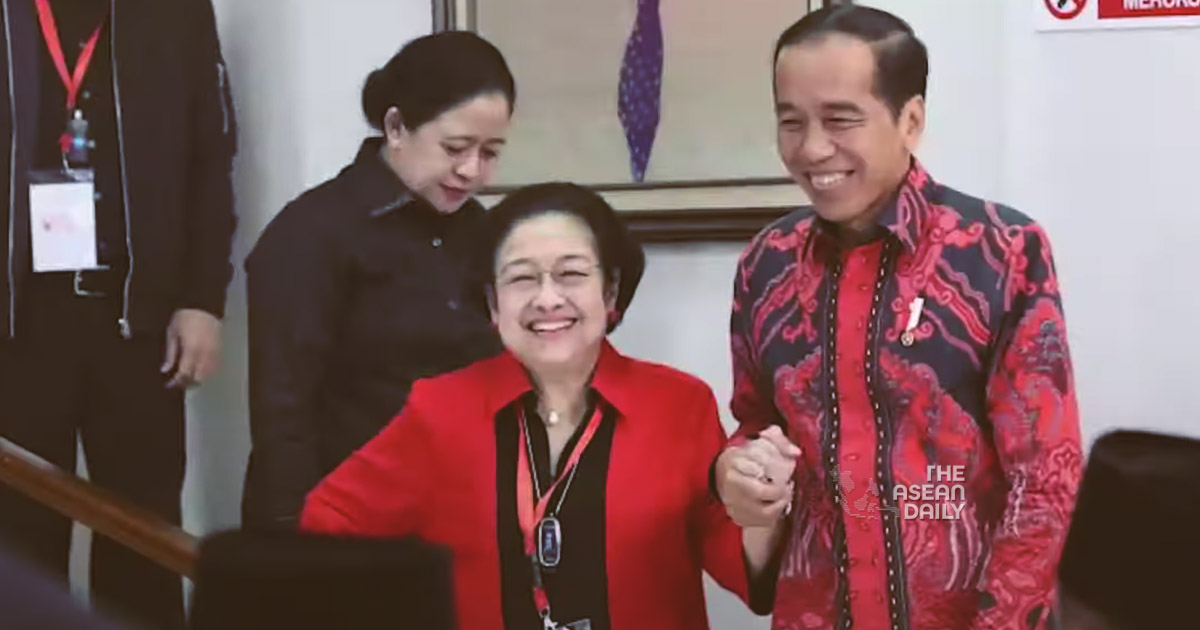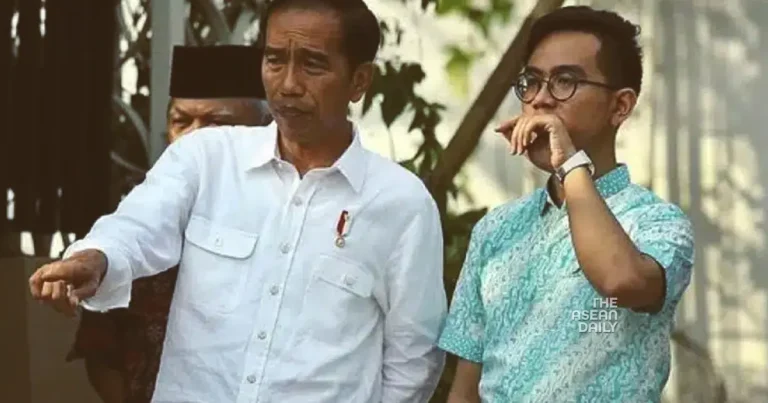28-10-2023 (JAKARTA) A rift between Indonesian President Joko Widodo and the ruling Indonesian Democratic Party of Struggle (PDI-P) has widened, after his eldest son decided to stand as a vice-presidential running mate for a presidential candidate not backed by the party, say analysts.
Now, both sides are in a “mutual hostage situation”, where Mr Widodo, known popularly as Jokowi, and PDI-P, which is chaired by former president Megawati Soekarnoputri, cannot engage in open hostilities because they both need each other for political mileage for now, said one analyst.
“On the one hand, President Jokowi still needs PDI-P to maintain the stability of his government until the end of his term,” political analyst Yoes Kenawas from Atma Jaya University told CNA, adding how the president still needs its legislators’ backing to push for various programmes, with PDI-P being the biggest party in parliament.
Besides, if the government is unstable, it will hurt his reputation, which could affect his son’s chances at becoming a VP, said Mr Kenawas.
“And on the other hand, PDI-P will be very careful to attack President Jokowi because his approval rating is still very good,” said the analyst, as he pointed out how Jokowi has massive followers and loyal volunteers who will follow whatever he says or believes in.
He added that this prospect will make PDI-P hesitant to attack him openly to avoid damaging its chances at the presidential and legislative elections on 14 February next year.
The relationship between both sides has been deteriorating since as early as mid-2022 over their perceived differences in who to back as presidential candidate in the election, in part fueled by Mr Widodo’s efforts to build his own political dynasty and to protect his legacy.
The latest wedge being driven came when Defence Minister Subianto, 72, who is chairman of the Great Indonesia Movement Party (Gerindra), picked Mr Widodo’s son Gibran Rakabuming Raka, 36, who is also mayor of Solo in Central Java, as his VP running mate.
Both registered themselves as presidential and vice-presidential candidates at the election commission on Wednesday (25 October), even though Mr Raka was still a member of PDI-P, as is his father.
The candidate pairing was the third and last to register, after former Jakarta governor Anies Baswedan, 54, and the chairman of the Islam-based National Awakening Party (PKB) Muhaimin Iskandar, 57, were the first to register on 19 October.
Another pair that also registered that same day were former Central Java governor and PDI-P’s Ganjar Pranowo, 54, and running mate, Coordinating Minister for Political, Legal and Security Affairs Mahfud MD, 66.
PDI-P is endorsing former Central Java governor Mr Pranowo and Mr Mahfud. Jokowi, whose approval rating has been consistent since he came into office nine years ago at about 70 per cent, is barred from seeking to run again in next year’s election on 14 February as the constitution only allows a person to be president for two terms.
His term will formally end on 20 October 2024, when a new president and vice-president will be sworn in.
Until then, analysts believe Jokowi and PDI-P will try to maintain a cordial relationship even though it will become rockier and colder towards and after the February elections.
According to various polls, Mr Subianto is leading, followed by Mr Pranowo and Mr Baswedan coming in third place.
Should the February election outcome be similar, then Jokowi and PDI–P will be competing to win over the votes of Mr Baswedan’s camp.
However, once Indonesia has a new president on 20 October 2024, Mr Kenawas believes every party will try to consolidate in their own best interests.
WHEN AND HOW THE RIFT STARTED
Unlike Mdm Soekarnoputri whose father was Indonesia’s first president Soekarno, Jokowi came from a humble background. He was born and raised in a riverside slum of Solo and became a carpenter and entrepreneur after graduating from university.

Jokowi’s political career started when he met PDI-P elite FX Hadi Rudyatmo in 2004 after intending to be Solo’s mayor. Jokowi then joined PDI-P and teamed up with Mr Rudyatmo to be Solo’s mayor and deputy mayor respectively in the city’s 2005 election, which they won.
Jokowi subsequently became Jakarta’s governor in 2012, and while he actually still had three years left in his term, he ran to be Indonesia’s president in 2014, with backing by PDI-P.
At that time, Mdm Soekarnoputri told Jokowi in front of other PDI-P members, two months before the July 2014 election: “Mr Jokowi, I am making you a presidential candidate, but you are a party officer who must carry out party duties.”
When Jokowi won the election against Mr Subianto, many thought he would just be Mdm Soekarnoputri’s puppet.
But Jokowi managed to establish his own identity, being the first elected person who did not come from Indonesia’s political elite or military, and proved critics otherwise.
His relationship with Mdm Soekarnoputri and PDI-P was largely harmonious, having appointed her as head of the steering committee of Pancasila Ideology Development Agency in 2018.
Jokowi sought re-election in 2019 against Mr Subianto and again won the election.
In 2021, he appointed Mdm Soekarnoputri as head of the national research and innovation agency. She attended many state events, and the pair were often pictured together, smiling.
Jokowi has often said that Mdm Soekarnoputri was like his mother, and she has often stated he is like her son and best cadre. But speculations of their strained relationship started emerging when Mdm Soekarnoputri was absent at several state events in mid-2022.
This came after Jokowi had hinted that he wanted popular Central Java Governor Ganjar Pranowo, a fellow PDI-P member, to run in the upcoming 2024 election.
However, many said Mdm Soekarnoputri then had preferred her daughter, house speaker Puan Maharani, who, according to popularity polls, was not so well-received.
Mdm Soekarnoputri and Jokowi denied the allegations, and the relationship seemed on track when they were pictured again smiling at events.
Jokowi though later also hinted on several occasions that he thought Mr Subianto, who in August last year already declared his interest to run again, would be his successor.
In January this year, during the 50th anniversary of PDI-P, which Jokowi attended, Mdm Soekarnoputri boasted about her influence and said: “Without PDI-P, Mr Jokowi is just a poor thing.”
The president, who was in attendance, was seen laughing.
Another sign of a broken relationship between them came in April this year when Mdm Soekarnoputri finally declared Mr Pranowo as PDI-P’s pick for next year’s presidential race.
It was announced in Bogor a day before Eid, which Jokowi also attended.
But he had just landed in Solo that day to celebrate Eid and had to fly back to attend the announcement – a sign cited by analysts that the president was only informed about Mdm Soekarnoputri’s decision at the last minute.
But the rift between PDI-P and Jokowi became crystal clear through how Mdm Soekarnoputri announced on 18 October that Mr Mahfud would be Mr Pranowo’s running mate.
Jokowi did not attend the event, unlike when she had announced Mr Pranowo as PDI-P’s presidential candidate in April.
Mdm Soekarnoputri’s daughter Puan Maharani, who is the head of PDI-P’s political and security unit, told reporters Jokowi was absent because he was on a working visit abroad.
But Jokowi had returned to Indonesia on 21 October, before the registration period ended on 25 October, which meant that if PDI-P wanted to wait for him to make the announcement, there was still time.
Mr Subianto, for example, only announced Mr Raka as his running mate on 22 October and they registered themselves at the election commission on the last registration day.
JOKOWI’S DYNASTY
Analysts believe all the political manoeuvring by Jokowi is aimed ultimately at protecting his political legacy.
To do so, having his own political dynasty seems to be the safest bet, said political analyst Wawan Mas’udi from the University of Gadjah Mada.




